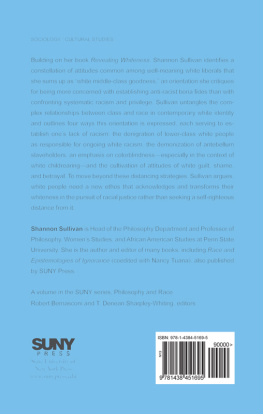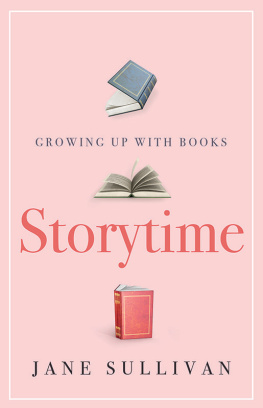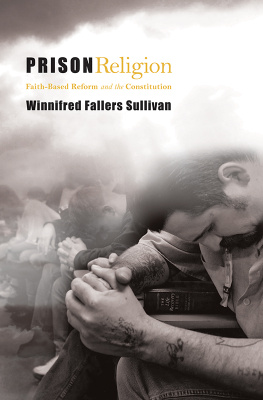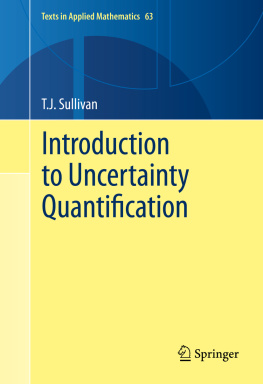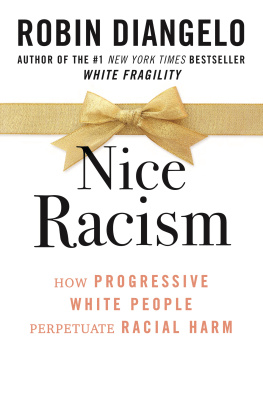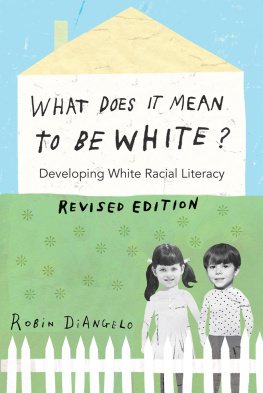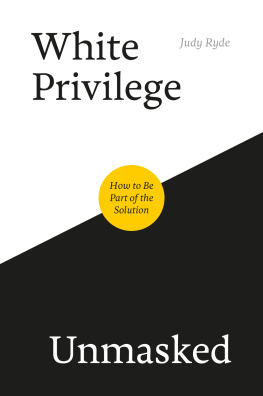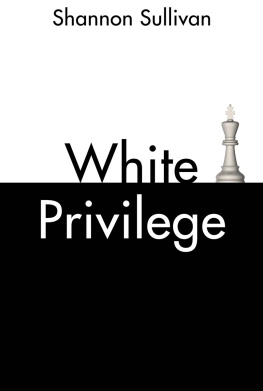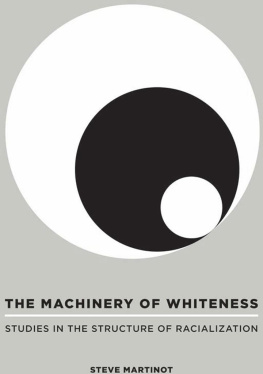GOOD WHITE PEOPLE
SUNY series, Philosophy and Race
___________
Robert Bernasconi and T. Denean Sharpley-Whiting, editors
GOOD WHITE PEOPLE
The Problem with Middle-Class
White Anti-Racism
SHANNON SULLIVAN
Published by State University of New York Press, Albany
2014 State University of New York
All rights reserved
Printed in the United States of America
No part of this book may be used or reproduced in any manner whatsoever without written permission. No part of this book may be stored in a retrieval system or transmitted in any form or by any means including electronic, electrostatic, magnetic tape, mechanical, photocopying, recording, or otherwise without the prior permission in writing of the publisher.
For information, contact State University of New York Press, Albany, NY
www.sunypress.edu
Production by Jenn Bennett
Marketing by Fran Keneston
Library of Congress Cataloging-in-Publication Data
Sullivan, Shannon, 1967
Good white people : the problem with middle-class white anti-racism / Shannon Sullivan.
pages cm. (SUNY series, Philosophy and race)
Includes bibliographical references and index.
ISBN 978-1-4384-5169-5 (hardcover : alkaline paper)
ISBN 978-1-4384-5168-8 (paperback : alkaline paper)
1. WhitesUnited StatesAttitudes. 2. Middle classUnited States. 3. Anti-racismUnited States. 4. United StatesRace relations. 5. United StatesSocial conditions1980 I. Title.
E184.A1S954 2014
305.800973dc23
2013025552
10 9 8 7 6 5 4 3 2 1
For Samantha, Sophia, and Phillip
Contents
Acknowledgments
I wish to thank a number of people who helped me with this book:
First and foremost, Phillip McReynolds. I couldnt begin to describe the ups and downs of writing, rewriting, and undergoing the review process of this book, and Phillip went through it all with me. He is my biggest supporter and best critic, and his positive feedback on an early draft of the introduction was especially important. He read all the versions of the book from beginning to end, providing crucial suggestions and comments. I know he is just as happy as I am to see it published.
I also am grateful to Lucius Outlaw, who provided some much needed moral support during the review process. He understood early on, better than I did, the spiritual side of the book, and that understanding was crucial to the final round of rewriting. I appreciate Melissa Wrights enthusiastic response to early versions of several chapters of the manuscript, which was important for keeping the project going. I happily thank Robert Bernasconi and T. Denean Sharpley-Whiting (series editors) and Andrew Kenyon (SUNY Press) for their interest in and support of this book. Andrew provided particularly helpful editorial guidance during the review process. I benefited from thoughtful feedback from members of the philosophy and the womens studies departments at Penn State University to whom I presented portions of and the conclusion. I also thank the anonymous reviewers for SUNY Press for their lively feedback. I hope that the improvements I made to the book as a result of their collective comments inspire additional vigorous debate in the field.
Many thanks to John Christman and Chris Long for serving as acting heads while I was on sabbatical, during which I finished final revisions of the book. I owe each of them a beer (or several). I am very grateful to Dean Susan Welch and Penn State Universitys College of the Liberal Arts for leave from my headship duties. Je tiens remercier la bande de femmes Paris qui ma tenu compagnie pendant les derniers processus de critique et de rvision: Caroline, Corinne, Rachel, Dominique, Elisabetta, Ccile, Nathalie, Fabienne, Irena, Aime, Christelle, Laurence, Carole, Judith, Delphine, et surtout Sara. Et galement les bons messieurs: Nicolas, Andr-Pierre, Benot, Edward, et Serge. Nos rendez-vous du caf Les Artistes et nos soires de femmes me manquent dja! Japprcie aussi lamiti (et le prt du mixeur) de Mariana. Un merci final aux propritaires du caf Le Parroquet, mon bureau pour lanne.
I gratefully acknowledge permission to use the following previously published material in this book. and the conclusion include revised portions of On the Need for a New Ethos of White Anti-Racism (philoSOPHIA: A Journal of Continental Feminism 2, no. 2 [2012]: 2138).
Given the controversy stirred up by some of the claims in those essays, its not pro forma when I say that the books flaws remain my responsibility alone. I dedicate this book with love to Phillip and our two daughters, Sophia and Samantha.
Introduction
Good White Liberals
The white liberal and the white supremacist share the same root postulates. They are different in degree, not kind.
Lerone Bennett Jr., Tea and Sympathy:
Liberals and Other White Hopes
What can white people do to help end racial injustice? This is a question with a complicated history in the United States, in large part because most white people havent wanted to ask, much less answer it. The question dates back at least until antebellum America when a small number of white people participated in the Underground Railroad, which enabled black slaves to escape their white masters, and helped work to end legalized slavery. Its a question that can be found in twentieth-century civil rights struggles when someagain, not manywhite people engaged in lunch counter sit-ins alongside African Americans and traveled to the South to help register African Americans to vote.
Its also a question that assumes that white people can do something positive with regard to racial justice. Not everyone would agree with this assumption. Perhaps most famously, Malcolm X recounts in his autobiography that when a white college girl heard him speak on white racism and agonizingly asked him What can I do? he dismissed her with the terse reply Nothing.lives, families, and communities, and thus there was nothing that white people could do to help the United States achieve racial justice for black people and other people of color. White people inevitably were the problem, according to Malcolm X, and the only positive thing they could do was stay out of black peoples way.
White people are a big part of the problem. So too, of course, are white privileging institutions, tax codes, and other societal structures that help sustain white domination. But not all white domination operates on an impersonal level. A great deal of it functions through the practices and habits of individual white people and the predominantly white families and communities to which they belong. This does not mean that white people are atomistic individuals, sealed off from the world around them. On the contrary: like all human beings (and other living organisms), white people are constituted in and through transactional relationships with their environments. Their experiences, beliefs, and behaviors both are shaped by and contribute to a white-dominated world. And so the personal question of what white people can do still needs to be asked and answered. To say that white people can do nothing is to let them off the hook too easily. It says that they do not have to respond to the racist damage that white people historically have and presently continue to cause, and it countenances their continued negligence and inaction with regard to white domination of people of color.
Racial justice movements are not dependent on white people for their success. The struggles, protests, and demands of people of color have been and most likely will continue to be the main motor driving racial justice movements. But white people can play a positive role in those movements as well. In fact, I think they have a small, but somewhat unique role to play given the persistence of de facto racial segregation in work places, neighborhoods, school systems, places of worship, and so on. Just as feminist movements need men who are willing to speak out against sexism and male privilegeespecially in all-male settings such as locker rooms and fraternity housesracial justice movements need white people who are willing to speak and act against white racism when they encounter it in their families, neighborhoods, workplaces, and elsewhere. As important as women are to feminist change, eliminating sexism should not be reduced to womens work. Likewise, white people who care about racial justice should not sit back and wait for people of color to clean up the mess that white people have made. White people need to make a positive contribution to racial justice even though their contributions will be secondary to those of people of color.

